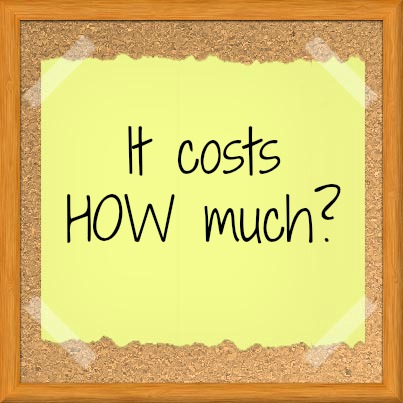Often people who decide they need to make money online start out looking for “free” tips to do so. After all, they’re short of money, so it makes sense that they don’t have spare cash to invest in starting a business.
Taking advantage of this, the seedier Internet marketing gurus foster the impression that “It’s easy and free to make money online because you don’t have the traditional expenses of an offline business: premises, stock and staff”. They suck desperate and cash-strapped folk in with lies and promises of wealth round the corner saying you can do it all “free”.
Be warned!

I tried very hard to do it all free. In the “old days” of Internet Marketing it probably was possible – with hard work. But nowadays there are so many different aspects to online marketing that it’s virtually impossible.
I only started seeing success (in the bank!) when I started learning from people better than I am, and taking their advice to pay from professional business tools.
Many of the professional tools have affiliate offers so that, when you recommend them to others, you can earn commission; and what started as a cost center, ends up as a profit center.
No Such Thing As A Free Lunch
You’ll probably have heard that expression without knowing the origin of the saying, although the sentiment is obvious. According to Wikipedia at https://en.wikipedia.org/wiki/There_ain%27t_no_such_thing_as_a_free_lunch
The “free lunch” refers to the once-common tradition of saloons in the United States providing a “free” lunch to patrons who had purchased at least one drink. Many foods on offer were high in salt (e.g., ham, cheese, and salted crackers), so those who ate them ended up buying a lot of beer.
It’s a marketing ploy!
Opportunity Cost
Another way to look at “free lunch” according to https://tifwe.org/no-free-lunch-why-understanding-opportunity-cost-matters/ is to consider opportunity cost – you’re swapping one thing for another. To apply it to the literal meaning of the “free lunch”, instead of paying cash for a lunch you have invested your time and probably created some kind of indebtedness to the “generous” donor.
It pays to remember that very little in life is genuinely free. It’s either paid for by time or money – and by lost profits.
While you are struggling to make “free tools” work, you are missing out on profits you could be making if you had used professional tools and training to build your business more professionally.
Yet that word “free” is so tempting to wannabe Internet Entrepreneurs. Putting it into my keyword research tool (which wasn’t free) set it churning out thousands upon thousands of phrases that included the word “free”. Here’s a tiny selection:
- How to make money as a stay at home mom free
- How can I earn money from home for free?
- Top 10 money from home free tips
- How to make money from home free
- Free website
- Free auto-responder
- Free traffic
- The list goes on and on….
So that’s what people are asking about. But does it make sense?
Why Is The Internet Different To Real Life?
Suppose you were starting an offline business. Would you imagine you could run it from a free shop, with robots working for you for free instead of staff who want paying, and pack it with customers spending their hard-earned cash on products you had acquired “free”? That sound like “pie in the sky” rather than a foundation for generating legitimate and repeatable profits.
So why would you suspend your common-sense and imagine that online you can start a business for free that will generate huge profits within days?
Surely “they” wouldn’t lie to you, those flashy actors posing in front of hired cars, being nice to their Mums and wanting to “give back to the community”? Perish the thought!
How Can A Quality Resource Be Free?
You CAN find plenty of free resources – even good quality ones. But you need to understand exactly why they are free. The starting point is to ask yourself: “Is the supplier a charity or is it a business?” If it’s NOT a charity, they need to make money, and how can they make money giving away something it cost them money to produce?
Well, there are several ways. Here are a few:
- To steer you into their paid product, sooner or later.
- The free offer will usually be in return for your email address, so that the supplier can email sales pitches to you and sell you their paid product(s).
- By displaying their adverts on the free website / eBook they gave you– taking your hard won visitors away to their offers. For instance, when you watch free videos on Youtube, someone’s advert may be shown.
Here are some particular examples of “free” or “cheap” resources, for you to consider whether the price of free is worth paying:

Free Gifts
Before the Internet, a free gift would usually be something tangible, with a real cost. However the advent of the Internet enabled a mass of “free” offers – because it’s so easy to create an eBook, even a whole training course. Smart marketers will offer a free or low priced book on high traffic sites such as Amazon that will easily out-rank your offerings.
So almost certainly a free gift online is a lead magnet to draw you into a marketer’s sales funnel, and you are trading your email address for the freebie. From then on you
- Have probably given them permission to “market” their future offers to you. This may be done professionally, or deteriorate into email blasts that are little better than permission-based spam, at which point you’ll be relieved to unsubscribe (and just hope they haven’t sold your email address to their other contacts).
- Maybe you feel a little sense of obligation to the provider of the free gift if it was useful?
It’s not just online that this happens. Many people in the complementary health sector offer free taster sessions of their therapy, but you’ll rarely get off the relaxation couch without a sales pitch!
Free Training
You can pick up free courses on Internet Marketing – but as someone in need of learning, are you capable of assessing the quality of the course you find? I just asked Google to find a “free WordPress training course” and it came back with 40,600,000 options! Do I trust the one at the top who has a paid advert, or do I have to try to find the best from the rest?
Here’s where I went wrong when I started out online: I decided to try and teach myself WordPress, free. I wasted a lot of time redesigning sites each time I learned something new “down the line”. My time would have been far better spent taking a paid course from someone in the industry with a proven track record, and learning everything from the same source, with support to ask for help.
If you’re looking to earn money online, why not short-cut the process and learn from those who have ‘done it before’ – yes including me? You can contact me here.
In case you’re not yet convinced that ‘free’ isn’t all it’s cracked up to be, let me share some of my ‘free’ experiences with you.
Free Traffic From Traffic Exchanges
You quickly realise that to make sales online you need “Traffic” – eyes on your site.
Often Traffic Exchanges are the first introduction to Internet Marketing for aspiring online entrepreneurs. They sit viewing ads they don’t want to look at so you can display your ads – which they don’t want to see. There may be a tiny conversion rate from complete newbies viewing the ads, but anyone who has spent more than a week working the traffic exchanges will have seen the same ads thousands of times, have no intention of buying anything and only be at the exchanges to tempt newcomers to buy their product.
So you are wasting your time to be able to show ads to people who have NO interest in them, instead of paying for adverts in places where there’s an interested audience. And wasted time can never be regained.
(That said – I DO include them in my marketing mix, and pay for the service – because they’re a great place to pick up complete newcomers and show them the mistakes they are in danger of making.)
A Free Website
Free sites will probably contain someone else’s offers, which will be strategically placed by those more skilled than you, to take advantage of your traffic.
In fact I once BOUGHT a website and found that the supplier had left his own adverts hidden deep within.
The other side of the coin is, how much will you value a free website? I once created a site for a friend who needed one for her offline business. It took me hours, but because she hadn’t made any investment in it she placed no value on it – despite the fact that it was a prime source of her customers. So when it got hacked (because at the time I was using “cheap hosting” – another false economy) – she casually said “Oh dear, we’ll have to make another one”. Of course the “we” was supposed to be “me”. I tried to explain that I couldn’t keep working for free, and perhaps she’d like to buy better hosting, or pay for security protection to prevent the same happening again! But the thought of paying real money wasn’t on her radar.
I caved in and produced a quickie website so that we stayed friends, but it was a real lesson to me that something you do for someone for “free” will have very little value to them. If she had paid good money for it, I’m sure she would have looked after it better and valued it more.
Free / Cheap Hosting
Yes, when I first started creating blogs I stupidly succumbed to a very cheap hosting platform. It soon became obvious that my site was always “going down” and terribly slow to load so visitors quickly lost interest and left.
Then I realised the hosting was cheap because it was shared with other site owners. One of the sites I shared with was hacked over and over again, the contagion spread to my blog and I had to spend hours trying to fix it, over and over again. Finally it was damaged beyond repair. I asked the hosting company to revert to a backup only to discover that they had ‘forgotten’ to do the backups they advertised. I lost my whole blog that had taken hours, nay weeks, to create.
Chastened, I soon changed to Managed WordPress hosting with a company that provides a reliable service and great support when I need it, in return for a realistic price that lets them afford to provide a good service.
Of course there is another way to get free hosting, and that’s with free blogs such as WordPress.com, Blogger.com and others not so well known.
Although these are reputable operations and some people have built huge businesses using them, be aware that you must play by their rules (research them first). Because if they don’t like what you’re doing you may find your site has disappeared!
What Value Do You Place On Your Business Image?
If you try to do everything on the cheap – free website, free email, free hosting, etc., what does that convey to a potential customer about the worth of your business?
To me it screams: “This business isn’t making enough money to pay for the basics”. This could mean either that their product is rubbish or that they won’t be about for long because they have made no real commitment to their business and may just be a “fly-by-night” con-merchant. Perhaps this won’t matter to a potential client, depending on the cost of their product and what service is needed from them in the future. For instance, I don’t mind if I buy a cheap book from someone, but if I’m buying complicated software, I’ll be looking for some support.
It’s a question you should consider when buying or selling online, because YOUR customers will be evaluating your site in the same way.
Is Everything That’s Free Bad?
Not at all! One of the most useful tools that sits on my browser day after day, permanently open is:
- Google calendar https://calendar.google.com and many of Google’s other free offerings
- I make frequent use of “free” image sites such as Pixabay.com, Pexels.com, unsplash.com and their content is superb. But be aware of the prominently displayed “paid for” images and don’t whatever you do think you can get away with using what should be a paid image. (Take your own photos, or use an AI image generator – like the image below, that I generated for another of my sites.)
- Free (open source) versions of Excel, Office etc, although my personal experience of one of these was so appalling that I was soon begging to part with my money for the “real thing”.
- Canva.com has an amazingly good free version. Yet the paid version offer enough extra features that I upgraded.
- Most of us use Facebook / Twitter / YouTube / Pinterest free – and that’s because they want you to be a captive audience for their paid advertisers. Accidentally (or deliberately) break their T&Cs and you’ll soon find yourself ‘in Facebook jail’ or suspended, without appeal. Even if (in my case) I had no idea what I had done wrong AND had paid Facebook for my audience.

Of late the general public is becoming more aware that on many social media sites “free” use is in return for your very detailed and personal information to be used to target you with personalised adverts.
Also bear in mind, that unlike the savvy blogger churning out articles day after day, social media users are generating content for someone else’s site owners and that site owner influences who will see the content you have created for them.
Is Free Software Any Good?
You’ll often find free auto-responders (software that sends emails to a list of your contacts who have agreed to be contacted). Often emails sent will be selling something part of the time, but it’s goods practice to send 80% helpful content vs 20% promotional.
A free trial is the best way to find out if a software product is good, so long as you understand why it’s free and what might be the “cost” of the free version.
Remember – why would anyone produce totally free software? How will they pay for and profit from their development efforts?
- They will normally want to give you a free trial, and then sell you their paid software. Before spending too long working with the free version, be sure you can afford the paid version if you may need it in the future.
- Perhaps you will have use of a restricted version of the software that shows adverts or promotes their software to others who see you using it.
- It might be missing a vital function that’s only available in the paid version
- Free auto-responders have a special peril – if you have built up a huge list on a free service, switching providers (if the first one becomes too expensive) is a hassle, and carries the risk of losing your subscribers if they have to opt-in again.
So while it’s great to have a free trial of software to evaluate, never forget that the ultimate aim is to convert you to a paid customer. After all, if the software developer isn’t making money from the software, who will pay for further development and support – not to mention their hosting and staff costs?
So How Can You Start A Business If You Have No Money?
I hope I have made you stop and think about the risk associated with “ falling for” the word free.
Don’t feel bad – when I started out I made most of these mistakes purely out of ignorance. Then I remembered that there’s no such thing as a free lunch.
But knowing that free carries its own costs and risks doesn’t help if you are genuinely down to your last dollar or two, and desperate.
What Can You Do Instead?
My recommendation is to step back a little and look at ways to accumulate some “seed capital” to invest in your business.
- Look round the house for items to sell on eBay
- Take a part-time job
- Can you cut down on take-aways or alcohol, and surely you can’t afford to smoke?
- Cut out your paid TV subscription and generate extra time by doing so
- If you have spare time, do you know anyone who would pay you to do odd jobs such as lawn mowing or car cleaning?
- If you can only work from home look at some of the genuine ways to get earn online without up-front costs. For instance: Fiverr.com. Don’t be misled by the term ‘Fiver’ there are some clever ways to boost your income to realistic rates. Think: “Would you like fries with that?”
When you have generated, say, an extra couple of hundred dollars a month using the methods above, you’re in a much stronger position to invest that money into professional tools to run your business.
Don’t risk the future of your online business by trying to rely completely on free resources. Contact me for help if you have any questions.


